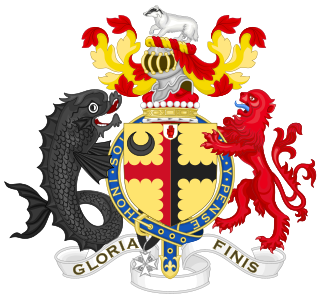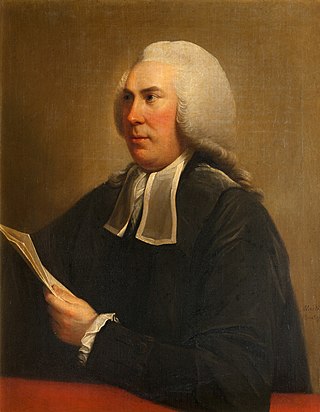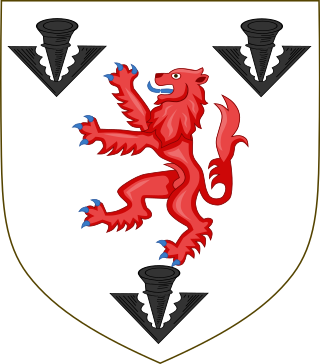
Marquess of Aberdeen and Temair, in the County of Aberdeen, in the County of Meath and in the County of Argyll, is a title in the Peerage of the United Kingdom. It was created on 4 January 1916 for John Hamilton-Gordon, 7th Earl of Aberdeen.

Marquess of Linlithgow, in the County of Linlithgow or West Lothian, is a title in the Peerage of the United Kingdom. It was created on 23 October 1902 for John Hope, 7th Earl of Hopetoun. The current holder of the title is Adrian Hope.

Earl of Galloway is a title in the Peerage of Scotland. It was created in 1623 for Alexander Stewart, 1st Lord Garlies, with remainder to his heirs male bearing the name and arms of Stewart. He had already been created Lord Garlies in the Peerage of Scotland in 1607, with remainder to the heirs male of his body succeeding to the estates of Garlies. This branch of the Stewart family were distant relatives of the Stewart Kings of Scotland.

Earl Waldegrave is a title in the Peerage of Great Britain. It was created in 1729 for James Waldegrave, 2nd Baron Waldegrave.

Earl of Gosford is a title in the Peerage of Ireland. It was created in 1806 for Arthur Acheson, 2nd Viscount Gosford.

Earl of Rosslyn is a title in the Peerage of the United Kingdom. It was created in 1801 for Alexander Wedderburn, 1st Baron Loughborough, Lord Chancellor from 1793 to 1801, with special remainder to his nephew Sir James St Clair-Erskine, as Wedderburn had no surviving issue of his own. Wedderburn had already been created Baron Loughborough, of Loughborough in the County of Leicester, in the Peerage of Great Britain in 1780, with normal remainder to the heirs male of his body, and Baron Loughborough, of Loughborough in the County of Surrey, in the Peerage of Great Britain in 1795, with the same remainder as the earldom. The 1780 barony became extinct upon his death, but the 1795 barony and the earldom passed, by the special remainder, to his nephew, who thus became the second Earl of Rosslyn. The second Earl was a Lieutenant-General in the Army and also held political office as Lord Privy Seal and Lord President of the Council.

Viscount Brookeborough, of Colebrooke in the County of Fermanagh, is a title in the Peerage of the United Kingdom. It was created in 1952 for the Ulster Unionist politician and Prime Minister of Northern Ireland, Captain The Rt. Hon. Sir Basil Brooke, 5th Bt., P.C. (N.I.), M.P.

Baron Farnham, of Farnham in the County of Cavan, is a title in the Peerage of Ireland. It was created in 1756 for John Maxwell, who had previously represented Cavan Borough in the Irish House of Commons. John Maxwell's son, the second Baron, was created Viscount Farnham in 1760 and Earl of Farnham in 1763. Both titles were in the Peerage of Ireland but became extinct when he died childless in 1779. His brother and successor, the third Baron, was again created Viscount Farnham in 1781 and Earl of Farnham in 1785. These titles were also in the Peerage of Ireland. His son, the second Earl, sat in the House of Lords as an Irish Representative Peer from 1816 to 1823. However, he had no children and on his death in 1823 the viscountcy and earldom became extinct.

Baron Macdonald, of Slate in the County of Antrim, is a title in the Peerage of Ireland. It was created in 1776 for Sir Alexander Macdonald, 9th Baronet, of Sleat. The Macdonald family of Sleat descends from Uisdean Macdonald, also known as Hugh of Sleat, or Hugh Macdonald, who was an illegitimate son of Alexander Macdonald, Earl of Ross. On 28 May 1625, his great-great-great-great-grandson Donald Gorm Og Macdonald was created a baronet, of Sleat in the Isle of Skye in the County of Inverness, in the Baronetage of Nova Scotia. The baronetcy was created with remainder to heirs male whatsoever and with a special clause of precedence which provided that it should have precedency over all former baronets.

Baron Northbrook, of Stratton in the County of Southampton, is a title in the Peerage of the United Kingdom. It was created in 1866 for the Liberal politician and former Chancellor of the Exchequer, Sir Francis Baring, 3rd Baronet. The holders of the barony represent the genealogically senior branch of the prominent Baring family. The name Northbrook is derived from a tithing of the local parish.

There have been four baronetcies created for members of the Acland family, which originated in the 12th century at the estate of Acland in the parish of Landkey, North Devon, two in the Baronetage of England and two in the Baronetage of the United Kingdom.
Alexander or Alex Lindsay may refer to:
There have been three baronetcies held by people with the surname Lindsay, one in the Baronetage of Nova Scotia and two in the Baronetage of the United Kingdom. One creation is extant.
William Lindsay was a Scottish diplomat and colonial governor. He was the second son of Sir David Lindsay of Evelick, of the Lindsay of Evelix family. He served as Great Britain's Resident to the Republic of Venice, as well as the Governor of Tobago in 1791. Like his elder brother John, he predeceased their father, and so David's titles passed to his third son, Charles.

The Dixie Baronetcy was created in the Baronetage of England at the time of the Restoration of the Monarchy in 1660 for Sir Wolstan Dixie (1602–1682), a supporter of King Charles I during the English Civil War and afterwards. He was descended from a brother of Sir Wolstan Dixie, the sixteenth century Lord Mayor of London who founded the Dixie Professorship of Ecclesiastical History in the University of Cambridge. Their home was Bosworth Hall near Market Bosworth in Leicestershire. The title became extinct with the death of the thirteenth Baronet, another Sir Wolstan Dixie, in 1975.
Alexander Lindsay of Evelick may refer to:
Sir Alexander Lindsay of Evelick, 3rd Baronet was a Scottish baronet from the Lindsay of Evelick family. He married into Clan Murray by his marriage with Amelia Murray, daughter of David Murray, 5th Viscount Stormont and sister of William Murray, 1st Earl of Mansfield. They had four children:
- Sir David Lindsay of Evelick, who succeeded Alexander.
- Sir John Lindsay, Royal Navy admiral and father of Dido Elizabeth Belle.
- Margaret Lindsay, who became the wife of the painter Allan Ramsay.
- Katherine Lindsay who married Alexander Murray, Lord Henderland

Alexander Murray, Lord Henderland was a Scottish judge and politician.

The Egerton family is a British aristocratic family. Over time, several members of the Egerton family were made Dukes, Earls, knights, baronets and peers. Hereditary titles held by the Egerton family include the dukedoms of Bridgewater (1720–1803) and Sutherland, as well as the earldoms of Bridgewater (1617–1829), Wilton (1801–1999) and Egerton (1897–1909). Several other members of the family have also risen to prominence. The Egerton family motto is Virtuti non armis fido.

Sir David Lindsay, 4th Baronet was a Scottish-born soldier in the British Army. One of the Lindsay of Evelix family, he succeeded to the baronetcy upon the death of his father, Sir Alexander Lindsay, in 1762.












